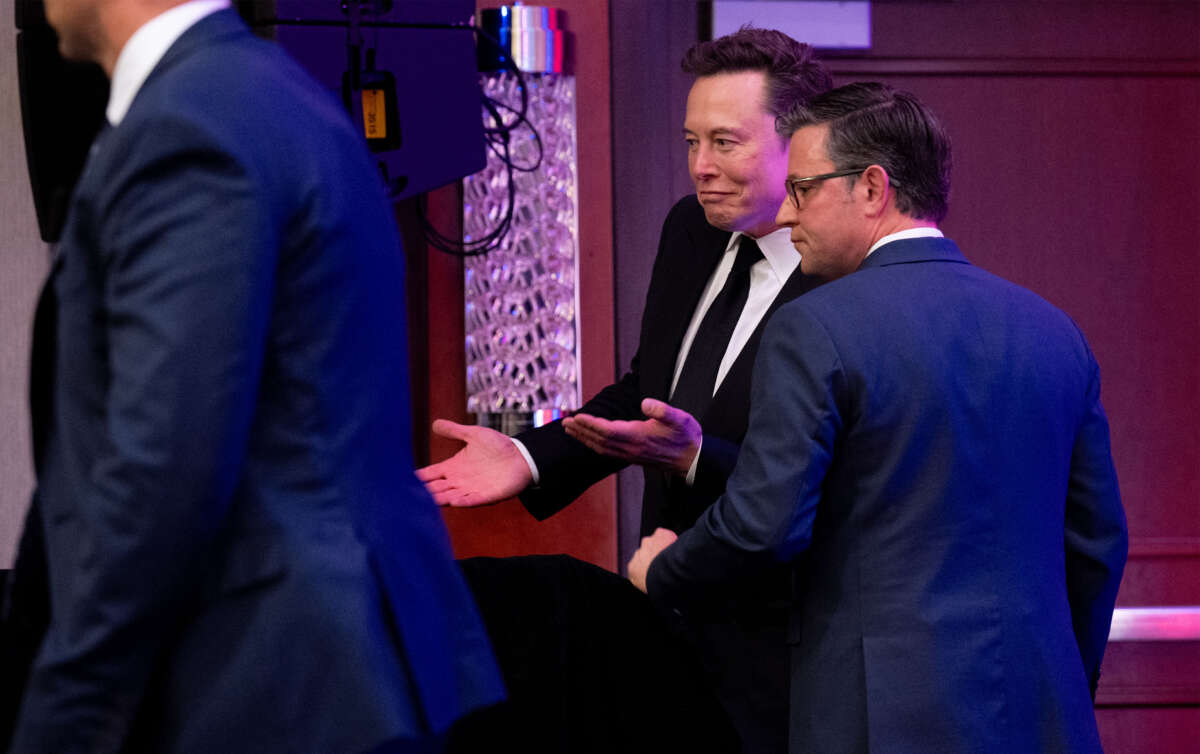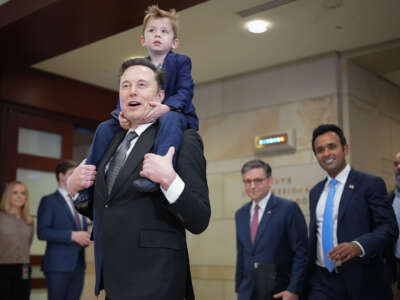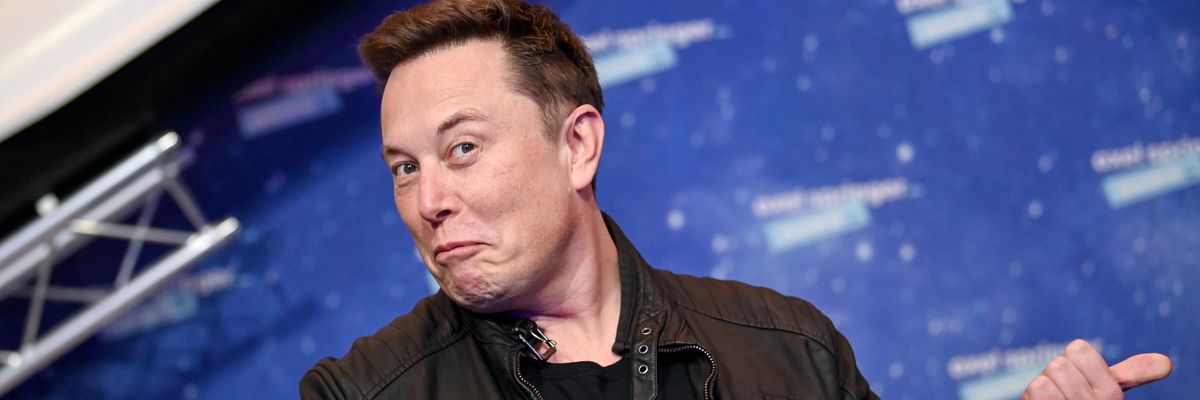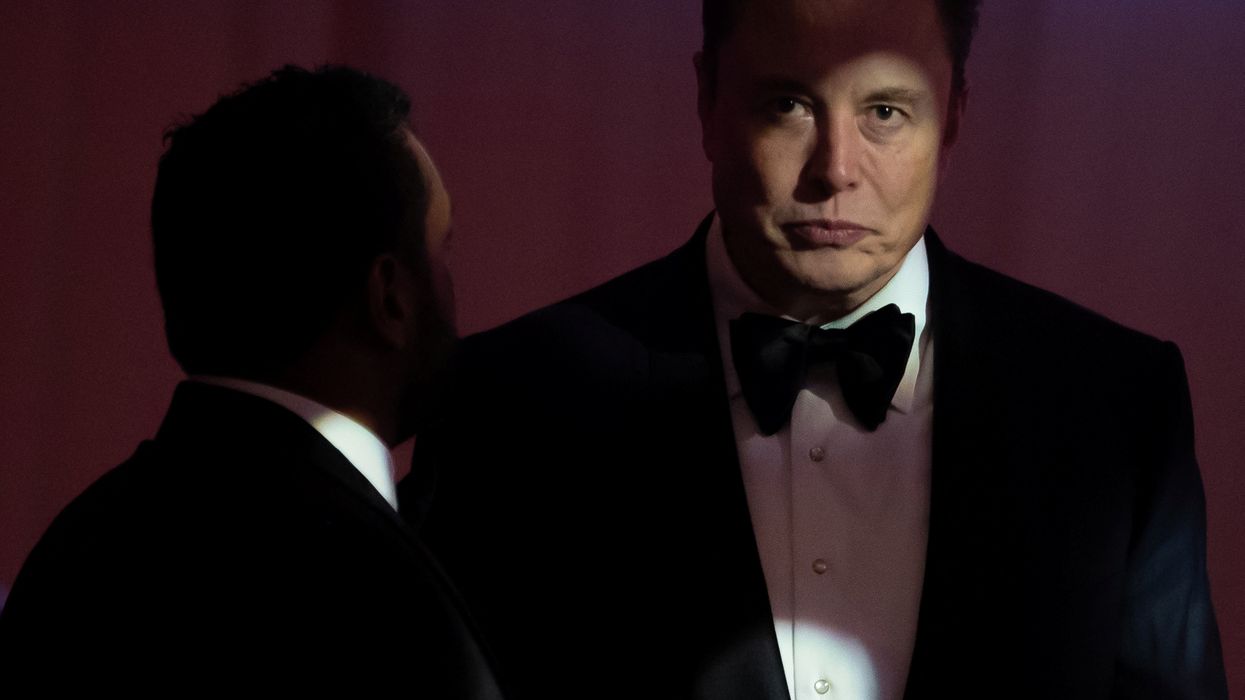By AFP
December 19, 2024

Elon Musk speaks at a rally for Donald Trump at Madison Square Garden in New York, October 27, 2024. - Copyright AFP ANGELA WEISS
Aurélia END
Elon Musk’s role in wrecking a bipartisan Congress deal to avert a US government shutdown has underlined his extraordinary influence over the Republican Party and the incoming administration of Donald Trump.
In addition to his usual title of the world’s richest man, Democrats are now describing him as “President Musk.”
Musk has been tapped by Trump to run the new Department of Government Efficiency (DOGE) agency, but the billionaire is throwing his weight around even before the president-elect takes office on January 20.
On Wednesday, shortly after 4:00 am, the hyperactive owner of Tesla and SpaceX used his social platform X to attack the budget bill hammered out by Republicans and Democrats in Congress to keep the federal government operating.
“This bill should not pass,” the 53-year-old Musk wrote in the first of what became a barrage of posts.
“Kill the bill,” he exhorted Republican members of the House of Representatives. “This bill is criminal.”
A number of Republican lawmakers quickly fell in line, with some even engaging in a bit of flattery.
“In five years in Congress, I’ve been awaiting a fundamental change in the dynamic,” Representative Dan Bishop commented on an X post by Musk. “It has arrived.”
Other right-wing members of Congress even went so far as to suggest that the South African-born Musk should take over as House speaker.
Trump himself joined the budget battle later in the day.
The 78-year-old president-elect denounced the spending bill as “ridiculous and extraordinarily expensive.”
The dramatic developments left the country facing a government shutdown just days before Christmas.
Musk rejoiced after the bill was torpedoed. “The voice of the people was heard,” he said. “This was a good day for America.”
He followed up by reposting a picture of himself in front of an American flag with the words “VOX POPULI” and “VOX DEI,” a Latin phrase which translates to “the voice of the people is the voice of God.”
After the intervention, Republicans in Congress on Thursday came up with a new funding package that satisfied Trump — and Musk.
– Who’s in charge? –
Democrats have painted the tech billionaire as unstable and a megalomaniac, and hope calling him “President Musk” will needle Trump.
“Democrats and Republicans spent months negotiating a bipartisan agreement to fund our government,” Senator Bernie Sanders said. “The richest man on Earth, President Elon Musk, doesn’t like it.
“Will Republicans kiss the ring?” Sanders asked. “Billionaires must not be allowed to run our government.”
Democratic Representative Jim McGovern said “at least we know who’s in charge.”
“He’s president and Trump is now vice president,” McGovern said.
Speaking on CNN, David Axelrod, who served as chief strategist for Barack Obama’s White House campaigns, said Musk and Trump need to “get together and decide who the president is.”
Musk’s rapid political ascension is unprecedented. While wealthy patrons have exerted influence before, no unelected businessman has ever wielded such political power.
Musk played a large role in the closing stages of Trump’s presidential campaign, appearing with him at a rally in Pennsylvania on the site where a gunman wounded the Republican candidate, and personally funding a reelection committee.
He has been omnipresent since Trump’s election victory, virtually taking up residence at Trump’s home in Mar-a-Lago Florida where the incoming president is mapping out the transition.
Musk and Amazon owner Jeff Bezos, a space race rival, dined with Trump on Wednesday evening at Mar-a-Lago.
Musk has not been formally named to Trump’s cabinet but his expansive brief of cutting federal government spending has sparked conflict of interest concerns.
SpaceX, for example, depends for a large part on US government contracts.
Musk’s $270 million in political donations during the November election cycle made him the largest political donor in US history.
But he shelled out far more for Twitter (since re-branded as X) in 2022, paying $44 billion.
“It’s weird to think that Elon Musk will end up having paid far less for the United States Government than he did for Twitter,” joked George Conway, a conservative critic.
Jessica Corbett,
December 19, 2024

U.S. President-elect Donald Trump shakes hands with U.S. House Speaker Mike Johnson (R-LA) as he meets with House Republicans on Capitol Hill in Washington, U.S., November 13, 2024. REUTERS/Brian Snyder REFILE - QUALITY REPEAT
U.S. President Trump and his allies, including billionaires Elon Musk and Vivek Ramaswamy, are blowing up bipartisan efforts to prevent a government shutdown that could begin this weekend with statements opposing a proposed stopgap measure.
"Currently reading the 1,547-page bill to fund the government through mid-March. Expecting every U.S. congressman and senator to do the same," Ramaswamy posted on Musk's social media platform X late Tuesday. Trump has asked the two billionaires to co-lead the forthcoming Department of Government Efficiency (DOGE), which they have said will pursue massive cuts to federal regulations and spending.
Musk responded to Ramaswamy early Wednesday, asserting that "this bill should not pass," a sentiment he repeated in several posts throughout the day, as the clock ticked closer to the Friday night deadline set by September legislation.
Ramaswamy also came out against the continuing resolution (CR) Wednesday morning, declaring that a "debt-fueled spending sprees may 'feel good' today, but it's like showering cocaine on an addict." He blasted various provisions, including $100 billion in disaster relief needed after hurricanes as well as funding to renew the Farm Bill for a year, replace the Francis Scott Key Bridge, and raise federal lawmakers' pay.
Donald Trump Jr. then weighed in, taking issue with a provision about subpoenas for U.S. House of Representatives data.
Appearing on "Fox & Friends" Wednesday, House Speaker Mike Johnson (R-La.) said that he was on a text message thread with Ramaswamy and Musk, claimed that "they understand the situation," and suggested he convinced them that the CR must pass.
However, later Wednesday, the president-elect and Vice President-elect JD Vance—who still represents Ohio in the Senate—released a lengthy statement opposing the CR and calling out specific policies, including the subpoena provision and the pay hike for lawmakers.
Trump and Vance—who are set to take over for Democratic President Joe Biden and Vice President Kamala Harris next month—also argued that "the most foolish and inept thing ever done by congressional Republicans was allowing our country to hit the debt ceiling in 2025. It was a mistake and is now something that must be addressed."
"Increasing the debt ceiling is not great but we'd rather do it on Biden's watch," the incoming Republican leaders said. "If Democrats won't cooperate on the debt ceiling now, what makes anyone think they would do it in June during our administration?"
"Republicans want to support our farmers, pay for disaster relief, and set our country up for success in 2025," they claimed. "The only way to do that is with a temporary funding bill WITHOUT DEMOCRAT GIVEAWAYS combined with an increase in the debt ceiling. Anything else is a betrayal of our country."
Trump echoed that point in a series of posts on his platform Truth Social, saying that "if Republicans try to pass a clean Continuing Resolution without all of the Democrat 'bells and whistles' that will be so destructive to our Country, all it will do, after January 20th, is bring the mess of the Debt Limit into the Trump Administration, rather than allowing it to take place in the Biden Administration."
"Any Republican that would be so stupid as to do this should, and will, be Primaried," Trump added. "Everything should be done, and fully negotiated, prior to my taking Office on January 20th, 2025."
Citing unnamed sources familiar with Johnson's thinking, outlets including The Hill and Politico reported Wednesday that the House speaker is now considering trying to pass a "clean" CR that would cut provisions such as disaster aid and economic assistance for farmers.
According toPolitico, "As GOP members streamed into Johnson's office to pick up gifts and stop by an ironically timed Christmas party, they didn't voice enthusiasm for Trump's demands."
.JPG)
White House Press Secretary Karine Jean-Pierre said in a Wednesday statement that "Republicans need to stop playing politics with this bipartisan agreement or they will hurt hardworking Americans and create instability across the country."
"President-elect Trump and Vice President-elect Vance ordered Republicans to shut down the government and they are threatening to do just that—while undermining communities recovering from disasters, farmers and ranchers, and community health centers," she continued. "Triggering a damaging government shutdown would hurt families who are gathering to meet with their loved ones and endanger the basic services Americans from veterans to Social Security recipients rely on. A deal is a deal. Republicans should keep their word."
Progressive leaders in Congress suggested that Trump's eleventh-hour statements on the CR were guided by his billionaire allies.
"Democrats and Republicans spent months negotiating a bipartisan agreement to fund our government," noted Sen. Bernie Sanders (I-Vt.). "The richest man on Earth, President Elon Musk, doesn't like it. Will Republicans kiss the ring? Billionaires must not be allowed to run our government."
Also taking aim at Musk, Rep. Maxwell Alejandro Frost (D-Fla.) said that "an unelected billionaire was crowned co-president by the Republican Party. They've given him the influence to make a damn post that throws a spending bill into limbo cause House Republicans are scared of him. No greater example of oligarchy. Where the ultrawealthy run the show."
Outgoing Congressional Progressive Caucus Chair accused House Republicans of "bowing to Elon Musk and pushing us toward a shutdown," which would force active duty service members to work without pay, pause rent and food assistance, and cancel and delay flights right before major holidays.
Rep. Mark Pocan (D-Wis.) quipped: "'President-elect' Elon Musk and former President Donald Trump want to shut down the government. Nothing like a couple billionaires wreaking havoc on working families right before the holidays."
Lisa Gilbert, co-president of the watchdog Public Citizen, similarly said that "an unelected billionaire should not be allowed to shut down the government. Musk's temper tantrum this afternoon—and the speed at which Trump fell in line after being cornered—is a terrifying preview of what a Trump-Musk co-presidency will look like."
House Minority Leader Hakeem Jeffries (D-N.Y.) was also critical, saying: "House Republicans have been ordered to shut down the government. And hurt the working-class Americans they claim to support. You break the bipartisan agreement, you own the consequences that follow."
Sen. Chris Murphy (D-Conn.) tied the anti-CR push to Republicans' ambitions to pass another round of tax cuts for the superrich.
"Remember what this is all about: Trump wants Democrats to agree to raise the debt ceiling so he can pass his massive corporate and billionaire tax cut without a problem," he said. "Shorter version: tax cut for billionaires or the government shuts down for Christmas."
Thanks to a bipartisan spending deal, lawmakers in the U.S. House of Representatives appeared to be on track to avoid a federal government shutdown before a Saturday, December 21 deadline.
But the deal ran into problems after Tesla/SpaceX CEO Elon Musk railed against it on X, formerly Twitter. And Sen. Bernie Sanders (I-Vermont) is slamming House Republicans for being influenced by him.
In a Wednesday, December 18 tweet, Musk — who President-elect Donald Trump has picked to head a new agency that would be called the Department of Government Efficiency (DOGE) — wrote, "Any member of the House or Senate who votes for this outrageous spending bill deserves to be voted out in 2 years!"
Musk, in a separate tweet, posted, "Please call your elected representatives right away to tell them how you feel! They are trying to get this passed today while no one is paying attention."
Sanders responded with a December 18 tweet of his own, writing, "Democrats and Republicans spent months negotiating a bipartisan agreement to fund our government. The richest man on Earth, President Elon Musk, doesn't like it. Will Republicans kiss the ring? Billionaires must not be allowed to run our government."
The following day on X, Axios' Mike Allen weighed in on Musk's role in sinking the bill.
Allen posted, "A Trump source tells @axios @JimVandeHei & me yesterday's @elonmusk @X storm, which sunk a huge spending bill, is the new playbook: GOP lawmakers got "instant and overwhelming feedback. Before, it had to be slowly funneled through conservative press. Now there is a megaphone."
“It’s clear who’s in charge, and it’s not President-elect Donald Trump,” said Washington Rep. Pramila Jayapal.
By Chris Walker ,

Independent journalism like Truthout has been struggling to survive for years – and it’s only going to get harder under Trump’s presidency. If you value progressive media, please make a year-end donation today.
At the behest of billionaire Elon Musk and president-elect Donald Trump, Republicans scrapped a bipartisan agreement to keep the government funded for the next three months on Wednesday, just two days ahead of a deadline for avoiding a shutdown.
Knowing he had to secure some votes from Democrats in the near-evenly split House of Representatives, Speaker of the House Mike Johnson (R-Louisiana) had crafted a continuing resolution that included raising the debt limit until March. Now that the bill has been shot down, it’s unclear whether a shutdown can be averted.
The bill included a number of Democratic Party demands, such as new regulations for health plan administrators, federal funds to rebuild the collapsed bridge in Baltimore, pay raises for members of Congress, and other provisions. The bill also included agreements to raise funding for responses to natural disasters by more than $110 billion, and $10 billion in additional aid to farmers across the U.S.
Upset with the continuing resolution heading for a vote later this week, Musk — who is set to lead the so-called Department of Government Efficiency (DOGE) within the Trump administration — spent most of Wednesday railing against the bill, publishing more than 100 posts on his social media site X calling for Republicans to oppose it.
Within those posts, Musk wrongly stated that Democrats were calling for a 40 percent increase in pay for lawmakers (when, in fact, the raise would have represented a 3.8 percent increase, the first raise for members of Congress since 2009); falsely claimed that the bill would block Republicans from being able to investigate the work of the January 6 committee; and wrongly asserted that the bill would force taxpayers to pay for a new NFL stadium in Washington, D.C. (The bill merely transfers management of an existing stadium to the district.)
Related Story

DOGE Heads Musk and Ramaswamy Signal Social Security Cuts Are Coming
Trump vowed to “not cut one penny” from Social Security, but his other statements and actions suggest that he plans to.
By Chris Walker , Truthout December 9, 2024
Musk also claimed that the government and the economy would “be fine” if there were to be a shutdown until Trump becomes president on January 20. Past shutdowns showcase how wrong he is — a shutdown crisis during Trump’s first term as president, for example, cost the U.S. economy $11 billion, and a month-long shutdown right now is likely to cost billions of dollars, too.
A lengthy shutdown could also make it harder for people living in the U.S. to access government services. National parks, museums and zoos could temporarily shutter, while other offices could have to shorten hours or close completely. Millions of federal workers would be laid off and others would have to continue working without pay. And while disbursements for Social Security, Medicare and Medicaid would continue, under a shutdown it’s possible that recipients of those benefits could see response delays if there are issues with their payments.
Following Musk’s tirade on X, Trump announced his opposition to the bill later that day, demanding that the entire legislation be renegotiated. “Republicans must GET SMART and TOUGH,” a joint statement from Trump and vice president-elect J.D. Vance read.
Some commentators have noted the timing of Trump’s opposition to the bill.
“Johnson probably wouldn’t be in this position if it weren’t for Musk, who spent all day Wednesday stoking rage on the right over Johnson’s deal. There was little evidence Trump cared much about the [continuing resolution] before that,” read an analysis from Politico’s daily “Playbook.”
That analysis continued:
The most prominent theory of what happened yesterday is this, per multiple Hill Republicans: Musk, as the anointed co-chair of the so-called Department of Government Efficiency panel, got waaay out over his spending-slashing skis and backed Trump into a corner.
Indeed, there are other indications that Trump wasn’t initially opposed to the bill’s passage, as he had privately urged Johnson to pass a continuing resolution right after he was elected president this year, to avoid any drama at the start of his term next month.
Perhaps trying to steer the spotlight back onto himself, Trump has now called for abolishing the debt ceiling, stating in a phone interview with NBC News that doing so would be the “smartest thing [Congress] could do,” and that he would “support that entirely.”
Trump also claimed that the debt ceiling “doesn’t mean anything, except psychologically” — demonstrating a deep lack of understanding regarding what the debt ceiling actually is.
Over the past decade, there have been several calls to eliminate the need to raise the debt ceiling through legislative decree, including by allowing the president to issue an executive order to raise the debt ceiling. But the debt ceiling, which is the amount the federal government is authorized to borrow in debt, would still exist if that were the case.
Ridding the U.S. of the debt ceiling entirely could feasibly lower the credit of the country, as happened after a different debt ceiling crisis in 2011. A significant change in the country’s credit rating could lead to a crisis of its own, in terms of the borrowing power of debt the U.S. could ask for from other countries.
Many Democratic lawmakers condemned Musk for his role in blocking the agreement, questioning who is actually set to be “president” of the next administration.
“You have to ask Donald Trump if Elon Musk is the one making decisions,” Sen. Jeanne Shaheen (D-New Hampshire) told HuffPost.
“It’s not Donald Trump asking for this. It’s very clearly President Elon Musk asking for this,” Rep. Daniel Goldman (D-New York) said on Bluesky.
Sen. Bernie Sanders (I-Vermont) also weighed in on the matter, noting that “the richest man on Earth, President Elon Musk,” was responsible for the bill being killed.
“Billionaires must not be allowed to run our government,” Sanders added.
Rep. Pramila Jayapal (D-Washington) echoed that sentiment, calling Musk a “shadow president.”
“It’s clear who’s in charge, and it’s not President-elect Donald Trump,” Jayapal wrote on social media.
"Welcome to the Elon Musk presidency," wrote Democratic Rep. Robert Garcia.

SpaceX owner and Tesla CEO Elon Musk poses on the red carpet of the Axel Springer Award ceremony in Berlin, Germany.
(Photo: Britta Pedersen-Pool/Getty Images)
Eloise Goldsmith
Dec 19, 2024
COMMON DREAMS
Congress is careening toward a government shutdown after U.S. President-elect Trump, egged on by billionaire Elon Musk—who helped bankroll Trump's reelection campaign and is slated to help oversee cuts to government spending and regulation in the new administration—torpedoed a federal spending bill that would have kept the government open for the next few months.
The episode has drawn sharp rebuke from Democrats, and caused a number to muse whether it's Musk who's really in charge.
"The U.S. Congress this week came to an agreement to fund our government. Elon Musk, who became $200 BILLION richer since Trump was elected, objected. Are Republicans beholden to the American people? Or President Musk? This is oligarchy at work," wrote Sen. Bernie Sanders (I-Vt.) in a social media post late Wednesday.
During a Wednesday night appearance on MSNBC, Rep. Jasmine Crockett (D-Texas) called Musk "basically a shadow president."
These sorts of remarks continued Thursday, with Rep. Robert Garcia (D-Calif.) writing: "Welcome to the Elon Musk presidency, where Donald Trump is now clearly the vice president. They want a government shutdown that would hurt millions of Americans. It’s totally insane," wrote Rep. Robert Garcia (D-Calif.)
Former Secretary of Labor Robert Reich echoed this sentiment in an opinion piece for Common Dreams published Thursday, writing: "If this isn't oligarchy, I don't know what is. You may not get access to services you depend on just before the holidays because an unelected billionaire shadow president wanted it that way."
[Related: If Musk Blocking a Key Spending Bill Isn’t Oligarchy, I Don’t Know What Is ]
Trump and Vice President-elect JD Vance threw cold water on the spending bill Wednesday afternoon with a joint statement, arguing that the bill included "DEMOCRATIC GIVEAWAYS." The directive from Trump came after Musk spent much of Wednesday airing his opposition to the spending package on the platform X, which he owns. In total, Musk shot off over 150 posts demanding the members of the GOP back away from the spending bill, according to The New York Times.
The bipartisan spending package unveiled by House Speaker Mike Johnson (R-La.) on Tuesday would have funded the government at current levels through March 14, and also provided some $100 billion for disaster relief as well as $10 billion in economic relief for farmers.
In their statement denouncing the bill, Vance and Trump also called for an increase to the debt ceiling—adding the fraught issue of national debt, which currently stands at more than $36 trillion, into the debate. Trump also called for getting rid of the debt ceiling entirely, according to Thursday reporting from NBC News.
Sen. Chris Murphy (D-Conn.) said this of the debt ceiling demand: "Ha! Trump wants to lift the debt ceiling for one reason and one reason only—so he can borrow shitloads of money to afford his new giant tax break for billionaires and corporations. In other words, saddle regular Americans with mountains more debt so the rich can get richer."

Elon Musk attends the America First Policy Institute (AFPI) gala at Mar-A-Lago in Palm Beach, Florida, U.S., November 14, 2024. REUTERS/Carlos Barria
ALTERNET
The Consumer Financial Protection Bureau (CFPB) came into existence when President Barack Obama signed into law the Dodd–Frank Wall Street Reform and Consumer Protection Act of 2010. One of the most aggressive proponents of the agency was now-Sen. Elizabeth Warren (D-Mass.), an Obama adviser who argued that aggressive regulation of Wall Street was badly needed in light of the financial crash of September 2008.
In 2010, the United States was still in a deep recession. The Great Recession was the country's worst financial crisis since the Great Depression of the 1930s, with the national unemployment rate averaging 9.6 percent that year (according to the U.S. Bureau of Labor Statistics).
During its 14-year history, the CFPB has had both defenders and detractors. Some conservatives and libertarians claim that the regulatory agency hobbles the markets; Warren, however, has maintained that the CFPB is a safeguard against devastating financial events like the crashes of 1929 and 2008.
READ MORE:What will Trump and GOP congress do to the Consumer Financial Protection Bureau?
In late 2024, the CFPB has a major foe in billionaire Elon Musk, CEO of Tesla, SpaceX and X (formerly Twitter). President-elect Donald Trump has picked Musk, along with MAGA businessman Vivek Ramaswamy, to head a proposed government agency that would be called the U.S. Department of Government Efficiency (DOGE)
On November 27, Musk tweeted, "Delete CFPB. There are too many duplicative regulatory agencies."
Forbes' Derek Saul reports, "Musk's post was in response to a recent podcast clip from Marc Andreessen, billionaire venture capitalist and fellow multimillion-dollar Trump donor, who said the CFPB's primary purpose is to 'terrorize financial institutions.' Yahoo Finance reporter Jordan Weissmann notes the CFPB shut down a portfolio company of Andreessen’s firm a16z in 2021."
The CFPB has also been a target of far-right Project 2025, the Heritage Foundation's highly controversial 920-page blueprint for a second Trump Administration. Project 2025 has called for Congress to abolish the agency.
READ MORE: Robert Reich: The last tariff increase 'ended up worsening the Great Depression'
But Warren remains an outspoken defender of the CFPB, recently telling the Washington Post, "The CFPB is here to stay…. There's big talk, but the laws supporting the CFPB are strong."
READ MORE: ''Rocketships to nowhere:' Not everyone on Team Trump is happy with 'co-president' Elon Musk
Read Forbes' full article at this link.








